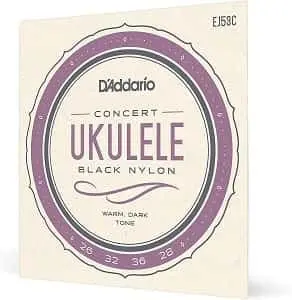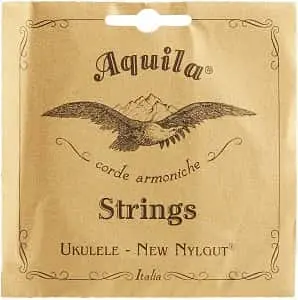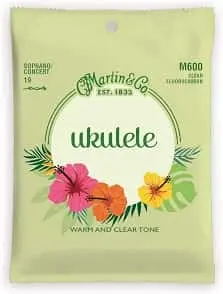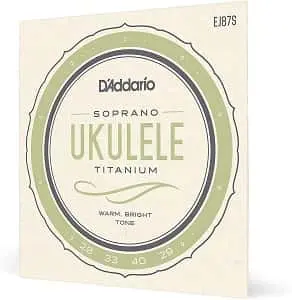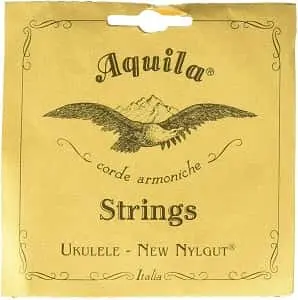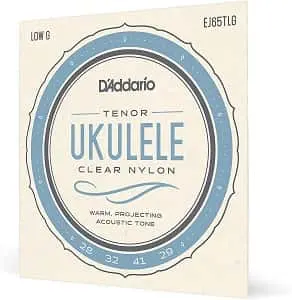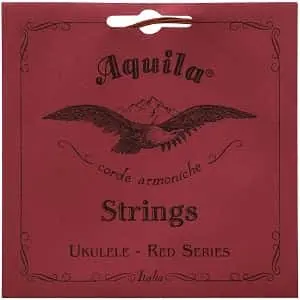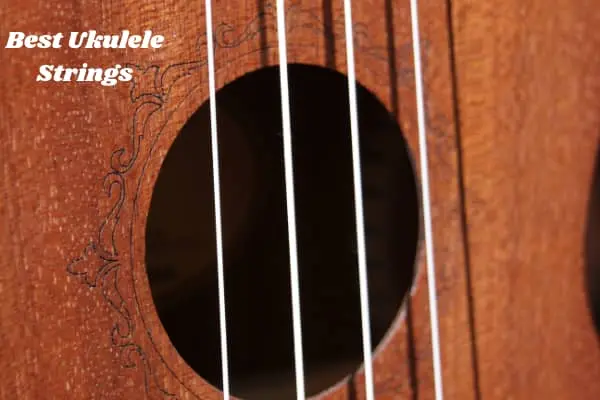
The ukulele, a musical instrument, is fun and straightforward. It became popular compared to a conventional instrument after its origin in Hawaii. Hence, many famous musicians opt for the ukulele in their songs nowadays. Similar to a guitar, a uke needs new strings from time to time. As a result, musicians search for the best ukulele strings.
But, choosing the correct one can be a hassle, especially with the variety in the market. So we intend to aid you in selecting one. Dive into our reviews to meet your needs now.
Top 7 Best Ukulele Strings for beginners to seasoned players
1. D’Addario EJ53C Pro-Arté Rectified Strings
When we talk about items for instruments, one of the most popular brands, especially ukuleles, is the D’Addario. The D’Addario EJ53C Pro-Arté Rectified, another model, has already gained popularity among musicians.
D’Addario EJ53C features the warmest-sounding black nylon for use with concert ukuleles. It brings standard GCEA tuning to complete all your songs with great precision and tone. This type will provide a warm and long-lasting acoustic tone.
Every black nylon string is based from the center to an ultra-smooth, ultra-precise final diameter for a beautiful feel and a unique tone. These are the best concert ukulele strings available at low prices.
Benefits:
- Designed for standard GCEA tuning
- Warm, rich, and long-lasting tone
- Excellent string for the correct playing style
Disadvantages:
- Some users say that they are less responsive
2. Aquila New Nylgut AQ-4 Soprano Ukulele Strings
Aquila, a well-known brand, is known for building strings for various musical instruments and too high-quality products for ukes.
The AQ-4 produces a more pronounced sound than regular nylon or fluorocarbon strings. That’s because it’s made from Nylgut, a particular type of polymer, mimicking the properties of old-school gut strings.
AQ-4 consists of three synthetic components in one material. These absorb less moisture to confirm tuning stability. Because they are manufactured precisely, they deliver increased accuracy of fret-intonation and guarantee durability.
Indeed, it’s a high G set, and Aquila offers the AQ-5 as their low G option. If you’re looking for great-sounding and durable models, these Nylgut items from Aquila could be a great choice.
Benefits:
- Sweet melody and melody
- Quick settlement
Disadvantages:
- Several players dislike the sound of the C string
3. Martin M600 Standard Concert Uke Strings
If you consider the best fluorocarbon ukulele strings, the Martin M600 might become an excellent option for your instrument. It’ll aid you in experiencing the original melody with Martin Uke Strings.
Its manufacturing process guarantees an easy-playing feel and a warm and conspicuous tone. Also, made from high-tensile fluorocarbon, this accessory makes tuning last longer and increases harmonic outcomes for a consistent tone.
To enjoy the best sound, this pack cooperates with every player, whether a beginner or a professional player. It fully exhibits the benefits that fluorocarbon strings can deliver.
If you explore the best concert uke strings that hold tuning amazingly, choose the M600.
Benefits:
- Amazing build quality
- High harmonic output
- The tuning holds up quite nicely
Disadvantages:
- They tend to be a bit thinner than other strings
4. D’Addario EJ87S Titanium Ukulele Strings
After the high praise of the previous D’Addario EJ87S, a question comes as to why another pack of D’Addario has come on our list.
These Titanium items not only boast 5-star reviews from nearly every customer, but whenever you think of customizing uke strings just for your needs, you’ll find a variety.
They are available in four sizes: Baritone, Soprano, Hawaiian-Concert, Concert, Hawaiian-Tenor and Tenor. It allows you to mix and match and find something that fits your playing style precisely.
Manufactured in the USA, D’Addario EJ87S delivers satisfying performance and quality. Besides, it gives a modern, potent, and projecting tone.
Many players find these models turn their uke into better sound, especially whenever likened to the stock strings included by most uke manufacturers.
Benefits:
- Fast, bright, and catchy tone
- Volume is rich and very dynamic
Disadvantages:
- They may feel a bit sharp
5. Aquila Soprano Regular Ukulele Strings
The number one best-selling string on Amazon is these Aquila Strings. Indeed, they have earned such a reputation as they’ve already done so much good.
These GCEA strings are constructed to walk together with the Soprano Uke because it appears in the key of C again. They have a smooth and polished surface that doesn’t restrict your finger movement or hurt your fingers, which some models tend to do.
New Nylgut properly provides these qualities, guaranteeing superior tuning stability than even the best gut and nylon strings. They might be in tune even after a week of regular use.
Benefits:
- Complete improvement
- Stay tuned without any issues
- High resistance to stress
Disadvantages:
- These are a little stiffer than the others
6. D’Addario Ukulele Strings EJ65TLG Tenor
Not amazingly, we’re not done reviewing D’Addario’s variety of strings yet. They are diverse from their predecessors, and there is an option for you to play any style that suits your needs.
These bring in tenor low-G tuning, producing a deep and crisp sound from your uke you’ve never heard before. Here, D’Addario replaces nylon with highly accurate and sensitive treble strings. These are environmentally friendly manufactured and let the packaging resist corrosion.
If you expect a pair of quality and robust models for your tenor uke, these nylon ukulele strings are more than qualified to accomplish their job appropriately.
Benefits:
- Optimized for Tenor Ukuleles
- Custom extruded clear nylon string
- Warm, sweet, and projective tone
Disadvantages:
- Some people feel loud on the G-string
7. Aquila Red Series AQ-86 Concert Ukulele Strings
The Aquila Red Series AQ-86 provides a very comfortable playing experience and contains a high volume compared to standard strings. They incorporate an advanced composite material and proprietary design, making the tone brighter and more responsive throughout the fretboard.
The proprietary composite material confirms tuning durability as it takes up less moisture than other synthetic strings. Each string shares the same diameter, and the density of each string element provides an equal feel and increases tone.
Whether you are a more seasoned player or intend improvement in the strings of your concert ukulele, the Aquila AQ-86 may be a better alternative.
Benefits:
- A unique feel and quality sound
- High-quality materials used
- More Responsive
Disadvantages:
- A bit expensive
Tips Before Buying The Best Ukulele Strings
We are about to speak about various types of strings. Before that, mentionably, different types of ukuleles require different types.
Although each uke has a different scale length, the length is the main difference between the types of strings.
Four standard ukulele sizes are available. These are:
Soprano
The most popular and general uke size is the soprano. It has a 21-inch body and a 13-inch scale length. The G-C-E-A or ADF#B is the tuning process for this size. It produces a brilliant sound. Therefore, assembling them with suitable strings will, of course, impact the sound they offer.
Concert
This type contains a 23-inch body and a 15-inch scale. It’s a little bigger and denser, louder sounding than the soprano. Its sound also gets the same. So, its strings get in the same tuning—G-C-E-A or ADF#B.
Tenor
The size has a 26-inch body and a 17-inch scale. It’s an excellent option for those with slightly larger hands. Larger bodies are capable of resonating as far as sound goes. Its sound is characterized as significantly more resonant and deep. It gets tuned to G-C-E-A, ADF#B, or D-G-B-E.
Baritone
The largest size is the baritone. Featured a 30-inch body and a 19-inch scale, this uke has the sound and look of an acoustic guitar. The D-G-B-E is the most common tuning.
If you hope for the correct models, you should know which uke types you pick.
What Are Ukulele Strings Made Of?
The strings that bring your instrument might be nylon. Do all strings come from nylon?
While the most common string type is nylon, several other types are available for your ukulele.
When you think of materials, you’ll find several options. Let’s look at these string names and compare them.
Nylon Strings
Manufacturers use a variety of different nylon polymers to produce nylon strings. Consequently, it is not uncommon for companies to create slightly different sounds for the strings they manufacture.
The method by which inexpensive nylon string is produced is named extrusion. Producers use molten nylon polymer through a hole by pushing to make a nylon filament, changing shape.
This way, you get different uke string thicknesses, producing different tones.
The best strings and somewhat more expensive models are manufactured by extruding nylon polymer but suitably ground to a precise diameter.
These also provide some textured feel some players like and others don’t.
Advantages of nylon string:
- These do not wear on your fingers like other types.
- The sound you achieve can be described as warm, although still too bright and fast.
Disadvantages:
- Temperature changes can affect the nylon strings. Consequently, they stretch and contract when exposed to hot and cold air.
Another notable thing you notice is that new models need a few times to settle in.
Changing your strings before a show is a better idea as you can get a cleaner and better-sounding tone.
However, give the models a few times to expand and settle thoroughly, as they are not in tune for long.
Gut Strings
Gut strings were the first to appear with acoustic instruments. As the name suggests, they are crafted from the guts of various animals.
Advantages of gut strings:
- Players love this material as it delivers a richer and more complex sound than nylon or titanium.
- Their feel is slightly different under the fingers, and the slide is better.
Disadvantages:
- Gut strings do not sustain as long as plastic or metal ones.
- These become too expensive.
You see that companies like Aquila have been able to simulate a certain amount of sound given by gut strings by treating the plastic in a certain way.
Fluorocarbon (plastic) string
Fluorocarbon or plastic ukulele strings are applied as an alternative to nylon, which is the choice of many musicians.
Their produced sound is similar to nylon, and these don’t put as much pressure on your fingers.
Benefits:
- Fluorocarbon strings become less affected by temperature changes than nylon.
- Another great thing is you can easily reap both this string type and nylon as needed.
So, if you buy unexpectedly long ones, you can cut them to size with scissors. Just concentrate on what they imply for tuning.
Steel Strings
These are general for acoustic guitars, but they’re not as general for use on ukuleles.
Disadvantages:
- The tension applied to the body and bridge of the instrument when using these types of strings might be damaging for the uke.
Usually, steel ones are employed in most hybrid instruments, such as guitar/ukulele or banjolele. So, if you don’t know about your ukulele, it is best not to use steel strings.
Titanium Strings
Titanium strings become much more durable than nylon or fluorocarbon.
Favorable:
- These also contain monofilament strings but become impossible to yank under pressure as they come from metal.
- The sound these strings offer is a bit brighter and louder. If you look to find more volume and projection from a ukulele, they’ll do the job rightly.
Wound metal strings
Wound metal uke strings contain a metal core and rotating elements around them.
Benefits:
- These are mainly made for larger ukuleles whenever musicians need a boost at the lower end of the frequency range.
Disadvantages:
- They might be a bit snappy, such as wound nylon strings.
Wound nylon strings
There are two parts to the wound nylon string. The inner core made of nylon is covered with curved material crafted from polymer.
Benefits:
- This string type is used for the baritone or tenor uke as two lower types. They offer a slightly deeper sound.
Disadvantages:
- The only downside to wound nylon strings is they might make your fingers squeak when fretting strings.
So, what would be the best strings for me? Okay, it depends on your preference.
The main reason is the sound that you expect from your instrument.
But if you’re on a tight budget, durability, and overall performance may get more crucial than sound.
Can I use guitar strings on a ukulele?
After reading this article, you might consider that buying strings for a uke is a pretty hassle. Therefore, you might be tempted to use guitar strings on your ukulele. Don’t do it. The uke and guitar are different sizes, so you use different models.
Conclusion: Best Ukulele Stings Review
Hopefully, you have mastered something new from this article. So, you can also pick a set of the best ukulele strings.
In addition, if you consider, this post is worth enough to share. We will be glad if you hit the sharing button. Above all, your feedback will extend our interest in writing.
